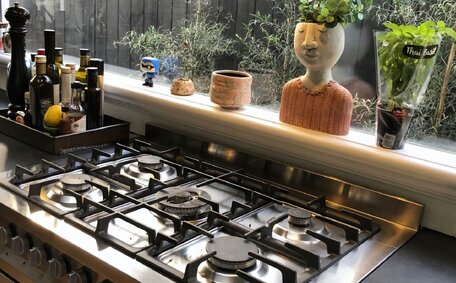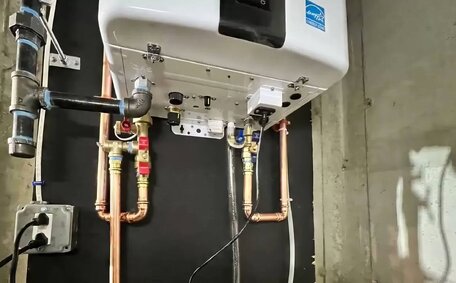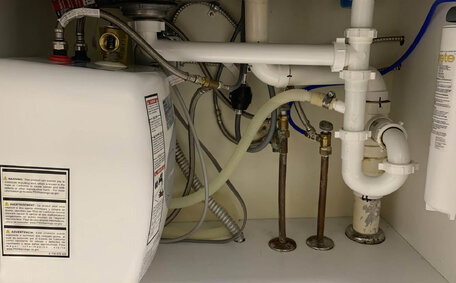Assessing the Emergency Plumbing Situation
In a plumbing emergency, quickly assess the situation to halt ongoing water damage and prevent it from worsening.
First, immediately shut off the main water valve in events such as burst pipes, gas leaks, or blocked drains.
Check all fixtures, pipes, and drains to locate the source. Evaluate the severity – is it a minor leak or a major gush? This will guide the urgency of your response.
Locate and shut off your property’s main water valve to cut the water supply and prevent further damage. Make sure all household members know where this valve is.
With the water off, assess the issue, mopping up the remaining water, and decide if you can safely resolve it yourself or need to call professional help. Unattended emergencies could lead to more damage to your water system. Promptly calling a licenced emergency plumber is usually the wisest course of action.
Once the water is off and you’ve evaluated the issue, determine if you’re able to conduct immediate repairs or if it’s best to wait for a plumber.
Identifying Potential Hazards
Leaking water on floors can lead to slippery surfaces and potential falls.
Faulty electrical components can cause electric shocks.
Wear non-slip shoes and contact a plumber if leaks worsen. Assume standing water is electrically charged until verified safe and avoid contact with pipe debris or residue.
Sewage backups and gas leaks also pose extreme danger. If you detect a natural gas leak, vacate the immediate vicinity and call emergency services or the gas company right away. Do not turn any electrical switches on or off, as a spark could ignite the gas.
Using any plumbing tools like wrenches, snakes, and cutters requires careful handling. Handle sharp and weighty tools with care and protective gloves, and ensure they’re secured when not in use to avoid injury.
Taking proactive steps and informed safety precautions during plumbing crises can minimise risks while awaiting professional help. Understanding the risks involved is the first step toward preventing accidents and minimising harm.
Shutting Off the Water Supply
When it comes to facing a plumbing emergency, the first crucial step is to locate the main water shut-off valve and call a local plumber if needed. Shutting off your water control, the valve that manages flow from the main line into your plumbing network, is essential.
Knowing the location and operation of the main valve is vital in a plumbing crisis. Ensure your household members are familiar with it.
Turn the valve to the off position to stop the water flow and prevent more damage. Depending on the crisis, this swift action can mitigate the problem, helping save time and money, and preventing any further scenarios where water could intensify damage.
After shutting off the main water valve, be prepared to mop up any spilt water with towels. Cordon off any areas still wet to soak up water and prevent slips or electric shocks. If needed, shut off power to the affected area at the breaker panel as another safety measure.
Quickly shutting off the main water valve prevents more damage and safeguards your home, buying you time to manage the issue before plumbers arrive for a permanent fix.
Contacting a Professional Plumber
In a plumbing emergency, prioritize shutting off the water and calling a professional, licenced plumber. DIY repairs can escalate to high-cost, complicated issues that necessitate professional intervention.
For prompt and dependable residential and commercial plumbing services in the Strathfield area, contact Strathfield Plumbing at 1300 349 338. Our plumbers are on call 24/7 to address your needs and perform urgent repairs, even outside standard business hours.
With more than a decade of experience, Strathfield Plumbing manages all types of emergency plumbing situations. We have the practical knowledge and tools to quickly stop leaks, address blocked drains, repair burst pipes, and more. Safety is our key focus.
Call our emergency plumbing hotline and we’ll send a plumber to your property immediately. We utilise digital location technology to send the closest available technician.
We offer the following common services for your plumbing requirements:
- Emergency repairs and replacements for your hot water system
- Gas leak identification and rectification
- Garbage disposal unblocking and sewer line inspection
- Pipe repair and maintenance
- Water leak detection
- Toilet, tap and valve repairs
At the first hint of a plumbing emergency, promptly call our expert team. We have the experience and equipment to handle any issue - big or small. Priority is given to emergency call outs.
Discover more about our 24/7 plumbing services at jobs@strathfieldplumbingservices.com.au or by visiting our website.
Using Protective Equipment
When dealing with plumbing emergencies, wearing proper protective equipment reduces the risk of injury.
Essential gear includes:
- Non-slip shoes - Avoid slips on wet surfaces
- Gloves - Protect hands from sharp debris
- Eye protection - Safeguard your eyes from hazardous chemicals and fluids
- Face masks - Prevent inhalation of dangerous fumes
Using gloves can reduce hand injuries by 60% in plumbing tasks. Non-slip boots prevent up to 70% of falls on slippery wet floors.
Wear protective gear even if you plan to call an emergency plumber, as initial hazards might remain. Steel-toed boots, chemical gloves, and wraparound glasses form the minimum level of protection.
Strathfield Plumbing’s technicians are fully equipped with industrial grade protective gear to operate safely in emergency situations. Allow our OHS-trained experts to handle plumbing scenarios with care and expertise.
Ensuring Adequate Ventilation
Adequate ventilation is crucial during repairs, particularly in confined spaces like crawl spaces or tank interiors. Stagnant air may contain hazardous fumes from leaks, mould spores, or sewage gases.
Open any available windows and doors to maximise fresh airflow. Consider setting up exhaust fans to actively circulate air. Wear a protective mask designed to filter airborne particles.
Taking active measures like ventilating and wearing a mask in tight plumbing spaces ensures health safety. Breathing difficulties, headaches, nausea, hearing loss, and lung irritation can occur from prolonged exposure to poor air. Ventilation adds vital oxygen while removing dangerous gases.
When it comes to specialist assistance with air quality testing and remediation during emergency plumbing tasks, Strathfield Plumbing has the necessary advanced equipment and training. Allow our licenced technicians to safely handle repairs in high-risk confined areas.
Exercising Caution with Tools
Special care is needed when using tools in plumbing emergencies to avoid injury. Educate yourself on safety protocols and proper tool use before attempting repairs.
It’s important to know how to handle wrenches, cutters, and other sharp tools to avoid severe lacerations. Always grasp tools with confidence and understand how to handle them to maintain control and reduce the risk of injury. Wear thick gloves to improve your grip when attempting to protect your hands.
Snaking cables can whip dangerously if mishandled. Drain augers and plungers should be inserted slowly and gently to prevent splashing contaminated fluids. Position your body carefully when using plumbing snakes to maintain stability.
Inspect all your tools for signs of damage before each use. Cracked handles, blunt blades, and frayed electrical cords can fail unexpectedly and cause harm. Well-maintained equipment greatly reduces safety risks.
When facing plumbing catastrophes, staying calm allows you to operate tools judiciously. Mastering proper handling techniques is crucial to ensure that emergencies can be managed safely and effectively. Call Strathfield Plumbing for emergency assistance if you have any doubts about safely using plumbing equipment yourself.
Creating an Emergency Plan
Being prepared and having the know-how before a plumbing issue arises saves valuable time and prevents undue stress during mishaps. Implement the necessary steps to take to establish an emergency response plan for your household.
It’s important to know how to use and label shut-off valves for quick access in emergencies. Keep phone numbers handy to call your plumber, like Strathfield Plumbing, a step anyone can take, ensuring accessibility from all phones. Assemble a plumbing first aid kit should include essentials like buckets, towels, a plunger, gloves, and a headlamp.
In a crisis, each person should know their specific responsibilities. Assign someone to shut off water, someone to call the plumber, someone to mop up excess water. Share the location of valves, metres, and electrical panels if others may need to use them.
Post emergency procedures clearly in your home for easy reference by family and visitors. Periodically review the plan with household members so it stays fresh in their minds. Update any contacts or supplies as needed.
Being ready to respond as a team can reduce your risk when plumbing catastrophes inevitably occur. Knowing ahead of time how to safely address issues reduces your risk and helps limit damage until professional assistance arrives.
Assembling a Plumbing Toolkit
Having the right tools on hand can prevent you from needing to turn off your hot water and minimize damage when an emergency strikes. Every household should have a plumbing toolkit with essentials, knowing that an emergency can strike without notice.
Essentials, including who can use them safely, are:
- Plunger - Unblock sinks and toilets
- Bucket - Catch water leaks
- Adjustable wrench - Tighten fittings and valves
- Torch - See in dark spaces
- Gloves - Protect hands
- Safety glasses - Shield eyes
- Old towels - To soak up excess water
- Drain snake - Clear clogged drains
Keep your plumbing toolkit in one location to minimise damage and for easy access when emergencies occur. Knowing what you can do and how proper tools can help permits you to initially manage various basic plumbing issues until a plumber arrives.
Conducting Preventative Maintenance
Routine maintenance of your plumbing and water heaters can avert emergencies and prolong the lifespan of your appliances. It’s recommended to have a licenced plumber conduct an annual inspection to protect your home’s plumbing and prevent issues that could damage your home.
During During these inspections, plumbers thoroughly examine pipes for leaks, assess their condition, ensure clear drains, and test water pressure. They can identify and resolve minor issues before escalating into major plumbing concerns.
You should also perform simple monthly plumbing tasks yourself like inspecting under sinks for leaks, pouring chemical drain cleaners down seldom used drains, and flushing toilets to keep valves operating smoothly.
Well-maintained plumbing systems can get fewer emergency callouts, safeguarding your home effectively. Identifying and resolving issues swiftly can help prevent costly emergency repairs and go a long way in safeguarding your finances. It also reduces property damage from leaks plus the inconvenience of utility disruptions.
To schedule preventative maintenance for your home, reach out to our team of experts at Strathfield Plumbing. Enlisting a qualified plumbing contractor like ours to regularly service your plumbing ensures everything is functioning optimally.






